Gerundium in English
Verbal forms are a very important point in the studyforeign language, and if you decide to learn the language in perfection, take this topic seriously and responsibly. In this article, we will discuss gerunds and what is gerund in English.
So, gerundia is a non-personal form of the verb in the English language, which is formed by attaching to the verb end ing. For example: the verb - to read, gerund - reading. In Russian, a concept similar to gerundno. The word reading from the above example can be translated as read. So, in spite of the fact that the gerund in English is a verbal form, to a greater extent it has characteristic signs of the noun. If we talk about its function in the sentence, then it can be both a subject, and an addition (direct or prepositional), and a predicative. Gerundia can be preceded by pronouns and prepositions.
If there is a noun with the same meaning as the gerund you use, it is better to use a noun (example: its arrival is not his arriving, a his arrival).
Gerundium in English can be used in different forms. It can be in the form of the present tense (I dislike shooting - I do not like to shoot); in a perfect form (We were charged with - we were accused of having committed to commit a crime); in the form of a passive voice (They both do not like being talked about - they both do not like being told about them); as well as in a negative form (Not knowing what to say, he left the house - not knowing what to say, he left the house).
Consider examples of the use of gerunds as a subject, predicative and complement:
Flying makes him sick.
During the flight, he vomits. (subject)
She does not allow smoking here.
She does not allow smoking here. (direct addition)
He does not believe in buying beer as an investment.
He does not think that buying beer is an advantageous investment of money. (Proposal Supplement)
My favorite activity is walking.
What is your favorite activity? Прогулка. (predicative)
Since the gerund in English is a verbal form, it necessarily has a number of signs of the verb. Like this part of the speech, gerunds take after themselves additions: I like reading books - I like to read books (books - addition to the gerund).
But notice that when a gerund is used with an article, it does not take a direct complement, and reading books turns into the reading of books.
Very often gerunds use possessive pronouns and a series of defining words (such as this, each, some etc.) that indicate the action being performed. For example: Does my smoking bother you? "Does it bother you that I smoke?" There is no hope of his homing - There is no hope that he will recover.
If we talk about such a concept as spokenEnglish, gerunds are used less often, and instead of possessive pronouns or definitive words, nouns or a series of personal pronouns appear in the sentence. For example: She insisted on my reading the letter.
Also personal pronouns and nounsa little more appropriate in those cases where the noun expresses an inanimate object or when the gerund is in the form of a passive voice. For example: Mr was being shocked at Mr Black being arrested "He was shocked when Mr. Black was arrested; There was no hope of rain stopping for another hour "There was no hope that the rain would stop in the next hour."
Very often, the use of gerunds with verbs of perception with nouns and personal pronouns. For example: She saw me running out of that classroom "She saw me run out of class."
So, the gerund in English meetsvery often, especially among native speakers. That's why students and just people who study English, and want to perfectly master it, you need to know the basic rules of using this verb form. First of all, one should pay attention to the difference in the use of the gerund and the infinitive (in the sentence, the infinitive and gerunds sometimes perform the same function, so it is often very difficult to decide where and what form of the verb to use more conveniently and more appropriately), to understand the gerund forms, and also To understand where it is appropriate, and where not. This article just acquainted you with the basic information, which has a lot of intricate subtleties and nuances. Good luck in learning English!
</ p>







